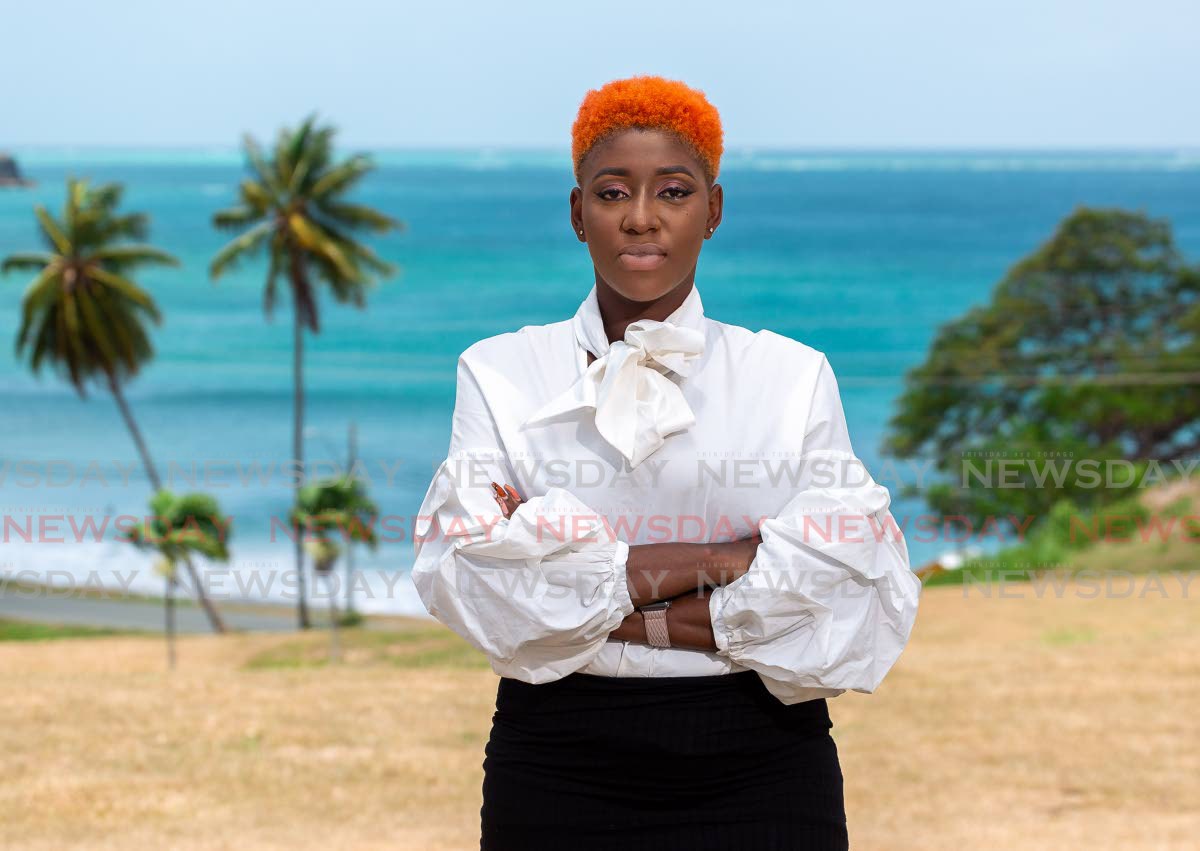Features
Corey Connelly

As a girl, Rayshawn Pierre-Kerr would sing to stuffed animals on couches in her grandmother’s living room.
She also ordered them to “pay attention” and “sing”, imitating the teachers under whom she performed at cultural events at her school and church.
One night, her ‘reprimands’ attracted the attention of her grandmother, who, “between sleep and waking”, felt that she was talking to people in the house.
“Grandma swore there were other people in space with me,” Pierre-Kerr, 30, recalled jokingly in an interview with WMN.
“But she kept telling me I’d be a performer because of the way I was constantly engaging and trying to direct the (mostly inanimate) things around me.”
That was more than two decades ago.
Since then, Pierre-Kerr has emerged as a respected performer, playwright, stage manager and cultural technocrat.
“Between life with my grandmother, church and school, the path to performing was clearly open and all I had to do was accept that this was what I was called to be and do. My childhood had some clear indications that I was destined to be an artist. All my skills led in that direction.”
As artistic director of the Tobago Performing Arts Company (TPAC), Pierre-Kerr is charged with the design, planning, coordination and execution of all artistic endeavors of its theater and dance unit.
She assumed the role on 1 August 2021, some two years after the company was founded by the former Tobago House of Assembly (THA) led by Ancil Dennis as the island’s main cultural ensemble.
The company, led by CEO Elvis Radgman, is mandated to provide opportunities to nurture talent within the cultural and performing arts in Tobago and create further avenues for performers to become leading cultural ambassadors.
Pierre-Kerr considered her role, so far, to be a “life-changing venture”.
“Of all my years working in the performing arts, TPAC is very different because of what it constantly demands. However, I am grateful that the team of talent in the company has become a family – a family that will drive the change and further development needed in Tobago’s cultural space.”
Describing her position as “incredibly challenging but equally rewarding,” Pierre-Kerr said she typically works 16 to 18 hour days in an effort to fine-tune the company’s various projects.
She leads the performing company’s dynamic cast in its final production on Sunday of Dr Lester Efebo Wilkinson’s 1970s classic Bitter Cassava, which ran for three days at Magdalena Grand Beach and Golf Resort, Lowlands.
The play, Pierre-Kerr said, is a folk drama that tells the story of one man’s misfortune.

According to the plot, Samuel Blondell, one of its main characters, throws his common-law wife out of his house and declares his intention to marry a young “red-skinned” lady from the town.
Justina, his common-law wife, curses Sam, his daughter-in-law and their children, before taking her own life in front of the entire village.
Pierre-Kerr said Bitter Cassava has something for everyone.
“Undoubtedly, Bitter Cassava is an outstanding piece of theater that has enjoyed many years of success since it was written in the 1970s. To this day, the play remains a standard for popular plays in the Caribbean and patrons can expect the story of rich and exciting that is woven into the drama, connected to the nuanced, Tobago aesthetics of song, dance and language.
Born in Point Fortin, Trinidad, Pierre-Kerr lived with her grandmother, a Venezuelan immigrant, from the age of six.
“We moved a lot. I’ve lived in more than 20 communities across the country.”
During her early years, she attended Dow Village Government Primary School and practically grew up on stage. In fact, she started singing calypso around the age of seven and has also danced, played steel, acted, directed and written monologues, plays and stories.
At the age of ten, the family moved to Buccoo, Tobago.
“Although I had been visiting Tobago since I was six years old, it was the first time I was able to call a place home. Tobago has been my home.”
Respected for his living heritage and strict adherence to traditions, Pierre-Kerr readily embraced the island’s culture.
At Pentecostal Light and Life Foundation High School, where she attended, teachers Merle Baird and Jared Prima (now TPAC director) encouraged her to participate in every competition—Amcham debates, youth forums, national PTA public speaking, competitions of scholarships and spelling. Bee.
“You name it, I competed in it and won.”

Later, while doing her A’Levels at Signal Hill Secondary, she gained greater exposure to national cultural events involving the performing arts.
“It further clarified my path.”
Eager to learn and excel in the arena, Pierre-Kerr entered the UWI campus, St Augustine with funding from the then Division of Culture, Tourism and Transport (now Tourism, Culture, Antiquities and Transport). She has been at UWI as a student and member of staff for the past eight years.
She credits the Light and Life Foundation for “cultivating a spirit of resilience in me that I always had but needed nurturing.”
Having grown up in what she called “the rich and wide world of Tobago’s culture”, Pierre-Kerr said she has an undying love for traditional arts, folk and oral arts and traditional carnivals.
She added that every play or stage production she has successfully designed and executed has been drawn from “the world of traditional and cultural knowledge”.
“And because so much of who I am, and who we are, is embedded in our traditions, the significance of these traditions in my research on using dance and drama as tools for social agency is ineffable.”
For Pierre-Kerr, Tobago culture is a living, breathing phenomenon.
“She is always alive, always alive, always present and always accessible. Culture is performative, yes, but it also lives and breathes because of our people’s daily interaction with it.”
While the island’s cultural luminaries have played a tremendous role in its transmission and preservation, Pierre-Kerr believes that young people have also kept the fire burning.
She said: “If you ever do an investigation of the cultural groups on the island, you will realize that much of its wealth is its youth as a human resource. So culture is thriving in Tobago and young people continue to play their part.”
However, Pierre-Kerr believes that there is a lot of work to be done, but she feels that it should first be recognized how culture is practiced and preserved through youth performances in a variety of forums.
The curtailment of non-essential activities during the Covid19 pandemic over the past two years was detrimental to the performing arts sector in the country.
But Pierre-Kerr is grateful that the company’s work was not badly affected.
She said that as part of its community, capacity and sector building mandate, the company was fortunate to have produced and executed several projects during the pandemic.
For example, TPAC produced and executed the island’s Republic Day celebration event, a music documentary and concert that highlighted Tobago’s musical talents. The company also collaborated with key stakeholders to produce the annual Tobago Day celebrations.
She said that through its various partnerships, TPAC also took a conscious decision to keep the sector alive by engaging all players.
“Through our stakeholder consultations and open forum, we have kept conversations open about the way forward for the development of Tobago’s creative sector and, by extension, cultural tourism.”
One of TPAC’s most recent projects, noted Pierre-Kerr, was the Tobago Tabanca Carnival Living Museum, one of the few initiatives organized by the Tourism, Culture, Antiquities and Transportation Division for Carnival.
The company is also engaged in several training programs for a music showcase and talent development project titled, Dingolay; a feature film about the Tobago Heritage Festival and other activities related to the island’s cultural showcase. TPAC also aims to continue its cross-sectoral collaborations.
Pierre-Kerr wants TPAC to become the premiere art institution of the 21st century.
“To do this, she must invest in and draw from her rich Tobago heritage, innovating in performance in a way that is resonant, meaningful and transformative for all audiences.”
She believes the company is the perfect vehicle to enable the island to take advantage of the global shift towards creative industries as a sustainable revenue earner, post-Covid19.


